1949: Philadelphia Eagles @ Los Angeles RamsThis series covers the history of the NFL through the prism of its yearly championship games.
Note: The gray boxes contain asides that provide interesting material but could be skipped without losing the continuity of the article.
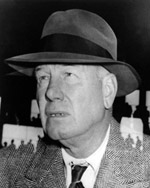
Greasy Neale
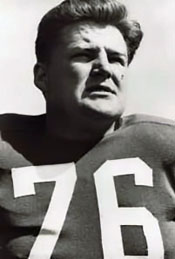
Bucko Kilroy
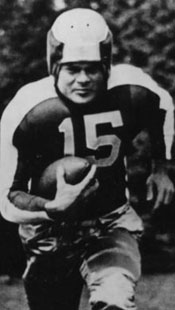
Steve Van Buren
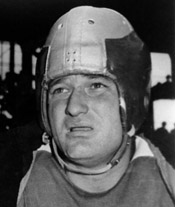
Tommy Thompson
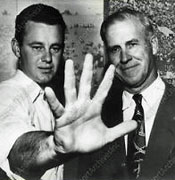
Norm Van Brocklin and
Clark Shaughnessy
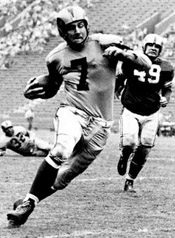
Bob Waterfield
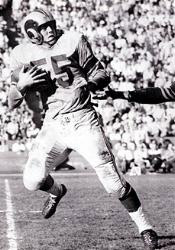
Tom Fears
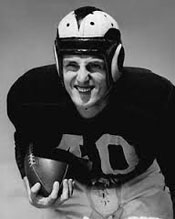
Elroy "Crazy Legs" Hirsch
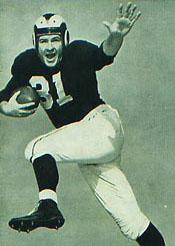
Dick Hoerner
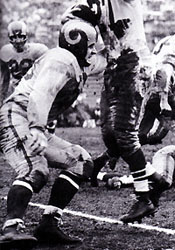
Dick Huffman
|
The owners enacted only one new rule for 1949: The free substitution rule (no limit on number of replacements after any play) was reinstated for one year.
- The rule was first adopted in 1943 because of the depleted rosters during World War II but was repealed in 1946.
- Free substitution would be made permanent in 1950 and still reigns today.
With the exception of the Redskins and Bears, NFL franchises suffered another losing season financially.
- Boston Yanks owner Ted Collins finally got his wish by moving his team to New York. With the AAFC's Big Apple franchise inhabiting Yankee Stadium, Collins' renamed Bulldogs were forced to share the Polo Grounds with the Giants. Despite trading for young Bears QB Bobby Layne, the club played like dogs, dropping from 3-9 in their last season in The Hub City to 1-10-1 in the Big Apple.
- Even the league's most successful team the last two seasons, the Eagles, continued to lose money, causing owner Alexis Thompson to sell the club to a group of 100 investors who paid $3,000 each for the privilege of owning part of an NFL champion. James P Clark was named team president, and Vince McNally was hired as General Manager. But, in reality, nothing changed. Coach Greasy Neale still ran the team.
- The continued financial turmoil kept the NFL and the AAFC at the negotiating table off and on during the offseason and during the regular season.
New ownership or not, the Eagles breezed to their third straight Eastern Division crown.
- Neale's club lost only once in twelve games, a 38-21 setback at the Bears October 16. Philly finished 4 1/2 games ahead of second place Pittsburgh.
- With all key players back from the '47 and '48 teams, the Eagles were, in the words of T Bucko Kilroy, "like a big fraternity. We were like brothers."
One of the few rookies, Leo Skladany, was amazed at the relationship of Neale with his players. "I couldn't get over the way the players talked to Greasy. First of all, they called him 'Greasy.' No one called him 'Coach' except me. And they did things just to irritate him. One day ... a couple guys caught this big, ugly fish and hid it under Greasy's bed. It stayed there for days stinking up the room until Greasy found it and threw it away. I thought, "Who treats a coach like this? Where's the respect?" But after I was there awhile, I understood. The guys had tremendous respect for Greasy; on the things that really mattered – like preparing for games and getting the team motivated – he was the boss. He spoke and everyone listened. The other stuff was just for fun, and I think, deep down, Greasy enjoyed it more than anyone."
Neale was not above taking suggestions from his men. "I have 32 coaches, not just 32 football players. With one or two exceptions, they are all college men. Why shouldn't I listen to what they have to say? They may have better ideas than I have."
- The Eagles' success still rested on the twin pillars of their outstanding 5-2-4 "Eagle Defense" and a ball-control offense built around All-Pro RB Steve Van Buren, who led the league in rushing attempts, yards, and rushing touchdowns. The other speedy halfback, Bosh Pritchard, provided a wide threat.
Van Buren's speed, power, and durability were in large measure due to his offseason training regimen. Twice a day in June and July every year he played in the NFL, he went to the beach near Cap May NJ. Wearing only shorts and high-top football shoes, he would run through the white, powder-soft sand on the beach at a brisk pace with weights strapped to his ankles.
- The pilot of the highest-scoring offense in the league, Tommy Thompson, has been somewhat overlooked for his contributions to the Eagles' success. The slick ballhandler was adept at faking a handout, hiding the ball on his hip, and flinging a pass downfield. Like Sammy Baugh of the Redskins before two-platoon football resumed, Thompson played a mean safety with 12 interceptions.
As a boy in Fort Worth TX, Thompson was struck in the eye by a rock thrown by a classmate and lost the central vision
in the eye. "It never affected me in sports," said Tommy. "I had some peripheral vision. I could see well enough." One of his quirks was that he wore the same set of shoulder pads through high school, college, and the pros. After the '48 season, the Eagles equipment manager sent all the team's gear away to a leather factory for repairs. Thompson's shoulder pads came back with a note that read, "Rejected. This article is too far gone to justify the expense of reconditioning it." When Tommy saw the pads in his locker with the note attached, he was indignant. "These pads are the best in the world. They get better every year."
The Cardinals' two-year reign in the West ended.
- The Los Angeles Rams got off to a 6-0 start. Meanwhile, the Bears, with Heisman Trophy winner Johnny Lujack taking over for veteran Sid Luckman, who was sidelined by illness, started 3-3, with two of the losses coming at the hands of the Rams, before winning their last six games. But it wasn't enough to catch LA, who stumbled down the stretch but won their finale against the Redskins to end 8-2-2.
- After the Cardinals' beloved coach, Jim Conzelman, resigned following the 1948 season to return to the business world in his hometown of St. Louis, the franchise was never the same. The two principal owners of the team couldn't agree on a replacement, one favoring Phil Handler and the other Buddy Parker. So they named the two assistants co-head coaches. The result was a 2-4 start to the season that led to Parker taking over as sole coach when Handler shifted to a front office role.
T-formation guru Clark Shaughnessy took the Rams to the top in his second year at the helm.
Since it was the Western Division's turn to host the title game, the Eagles looked forward to playing in much better weather than they endured in the previous two final games.
- The 1947 game in Chicago was fought on an icy field. Then the Eagles won the '48 championship in the snow in Philly.
- Because Greasy Neale was afraid to fly, the team took the train to Los Angeles. Few could sleep because of the rolling and bouncing of the train. So the Eagles were a tired bunch when they arrived in LA. Would the ordeal affect their performance?
Rookie C Chuck Bednarik recalled: "It took three days; it was terrible. Once a day, they'd stop the train, and we'd get off and practice in an open field somewhere. We'd practice for an hour, and the other passengers had to wait until we were done, then we'd get back on, and the train would start again. That's how we prepared for a world championship game. Can you believe it?"
Players spent the three days reading, playing cards, and discussing how they would spend the money they would make from a title game in the 100,000-seat Los Angeles Coliseum.
Pritchard recalled: "They were talking about the biggest live gate in league history. We were thinking, "Oh boy, we could get five or six thousand apiece for this." We each made 1500 the year before. Some players weren't even making $5,000 for an entire season, so this was like hitting the lottery."
- The Eagles had handed the Rams their first loss of the season, 38-14, in Philly in Week Seven. Also, Philly had not lost to the Rams in their last six meetings – five victories and a tie. Based on that, perhaps, the Philadelphians were 7-point favorites. However, Rams fans pointed to the fact that Philly suffered its lone defeat to the Bears, whom the Rams bested twice.
- Neale named rookie Clyde "Smackover" Scott, despite his damaged shoulder, to start in place of Pritchard because of the latter's gimpy knee. LA reported no injuries.
Neale called his team together at the hotel the night before the game.
- Several players openly yawned during the pep talk. When Greasy finished, he was disgusted.
- As the players started to leave, captain Al Wistert worried about his team's readiness for the game. So he called a meeting and gave his teammates a dressing down.
G Duke Maronic: "Probably the thing most of us were concerned with – but shouldn't have been – was the big payoff. We were already spending the money in our minds. You gotta remember now that we were playing in our third championship game, and we still were looking for the pot of gold. We had to settle for the losers' share in 1947, got snowed on in 1948, and now we thought we'd really rake it in. We're playing in a 100,000-seat stadium, and the projections were that a winner's share could be as high as $5,000 to $6,000, which equaled or bettered most of our yearly salaries."
E Jack Ferrante: "I honestly don't think many of us were really thinking football. We were more concerned with the nice weather and all the attractions in L.A. and all the money were were going to be making. The night before the game something happened, or I'm telling you we would have lost the game. Like I said, nobody was really serious. Al Wistert ... sensed this, and called a meeting. We all had tremendous respect for Whitey, and we listened when he talked. He said, 'We're not ready for this game. We'd better realize that we're playing a great team on their own field. And we'd better get the lead out and begin to whoop and holler or we can kiss the championship bye-bye.' That got us thinking the right way."
|
1949 Philadelphia Eagles
| # |
Player |
Pos. |
Hgt. |
Wgt. |
College |
Exp. |
| 11 |
Tommy Thompson |
QB |
6-1 |
192 |
Tulsa |
8 |
| 15 |
Steve Van Buren |
HB |
6-0 |
200 |
LSU |
6 |
| 27 |
Clyde Scott |
HB |
6-0 |
174 |
Navy |
1 |
| 30 |
Bosh Pritchard |
HB |
5-11 |
164 |
VMI |
5 |
| 32 |
Jack Myers |
FB |
6-2 |
200 |
UCLA |
2 |
| 33 |
Russ Craft |
DB |
5-9 |
178 |
Alabama |
4 |
| 35 |
Pete Pihos |
E |
6-1 |
210 |
Indiana |
3 |
| 36 |
Joe Muha |
FB |
6-1 |
205 |
VMI |
4 |
| 39 |
Bill Mackrides |
QB |
5-11 |
182 |
Nevada-Reno |
3 |
| 40 |
Frank Reagan |
B |
5-11 |
182 |
Pennsylvania |
5 |
| 41 |
Frank Ziegler |
HB |
5-11 |
175 |
Georgia Tech |
1 |
| 43 |
Jim Parmer |
B |
6-0 |
193 |
Texas A&M |
2 |
| 44 |
Ben Kish |
B |
6-0 |
207 |
Pittsburgh |
9 |
| 49 |
Pat McHugh |
DB |
5-11 |
166 |
Georgia Tech |
3 |
| 52 |
Vic Lindskog |
C |
6-1 |
203 |
Stanford |
6 |
| 53 |
Alex Wojciechowicz |
C |
5-11 |
217 |
Fordham |
12 |
| 60 |
Chuck Bednarik |
C |
6-3 |
233 |
Pennsylvania |
1 |
| 61 |
Duke Maronic |
G |
5-9 |
209 |
None |
6 |
| 64 |
Mario Giannelli |
G |
6-0 |
265 |
Boston College |
2 |
| 65 |
Cliff Patton |
G |
6-2 |
243 |
TCU |
4 |
| 67 |
John Magee |
G |
5-10 |
220 |
Rice |
2 |
| 70 |
Al Wistert |
T-G |
6-1 |
214 |
Michigan |
7 |
| 74 |
Walter Barnes |
G |
6-1 |
238 |
LSU |
2 |
| 75 |
George Savitsky |
T |
6-2 |
244 |
Pennsylvania |
2 |
| 76 |
Bucko Kilroy |
G-T |
6-2 |
243 |
Notre Dame |
7 |
| 78 |
Mike Jarmoluk |
T |
6-5 |
232 |
Temple |
4 |
| 79 |
Vic Sears |
T |
6-3 |
223 |
Oregon State |
8 |
| 80 |
Neill Armstrong |
E |
6-2 |
190 |
Oklahoma State |
3 |
| 81 |
Dick Humbert |
E |
6-1 |
179 |
Richmond |
6 |
| 82 |
Leo Skladany |
E |
6-1 |
210 |
Pittsburgh |
1 |
| 83 |
Jack Ferrante |
E |
6-1 |
197 |
None |
7 |
| 88 |
Jay MacDowell |
T |
6-2 |
217 |
Washington |
4 |
|
1949 Los Angeles Rams
| # |
Player |
Pos. |
Hgt. |
Wgt. |
College |
Exp. |
| 7 |
Bob Waterfield |
QB |
6-1 |
200 |
UCLA |
5 |
| 9 |
Gerry Cowhig |
FB |
6-2 |
215 |
Notre Dame |
3 |
| 10 |
Tom Keane |
E |
6-1 |
190 |
Ohio State |
2 |
| 13 |
Tank Younger |
FB |
6-3 |
225 |
Grambling State |
1 |
| 17 |
George Sims |
DB |
5-11 |
170 |
Baylor |
1 |
| 18 |
Fred Gehrke |
HB |
5-11 |
190 |
Utah |
6 |
| 20 |
Dick Huffman |
T |
6-1 |
255 |
Tennessee |
3 |
| 22 |
Fred Naumetz |
C |
6-1 |
222 |
Boston College |
4 |
| 23 |
Jack Martin |
C |
6-3 |
238 |
Princeton |
3 |
| 24 |
Tommy Kalmanir |
HB |
5-8 |
170 |
Pittsburgh |
1 |
| 25 |
Norm Van Brocklin |
QB |
6-1 |
190 |
Oregon |
1 |
| 27 |
Mike Lazetich |
G |
6-1 |
210 |
Montana |
5 |
| 30 |
Bob Agler |
FB |
6-1 |
208 |
Otterbein |
2 |
| 31 |
Dick Hoerner |
FB |
6-4 |
220 |
Iowa |
3 |
| 33 |
Jerry Williams |
HB |
5-10 |
175 |
Idaho |
1 |
| 34 |
Don Currivan |
DB-E |
6-0 |
193 |
Boston College |
7 |
| 40 |
Elroy Hirsch |
E |
6-2 |
190 |
Wisconsin |
4 |
| 42 |
Al Sparkman |
T |
6-6 |
253 |
Texas A&M |
2 |
| 46 |
Frank Hubbell |
E |
6-2 |
222 |
Tennessee |
3 |
| 47 |
Bobby Thomason |
QB |
6-1 |
195 |
VMI |
1 |
| 54 |
Ray Yagiello |
G |
6-0 |
220 |
Franklin & Marshall |
2 |
| 55 |
Tom Fears |
E |
6-2 |
215 |
Santa Clara |
2 |
| 56 |
Jack Zilly |
E |
6-2 |
212 |
Notre Dame |
3 |
| 57 |
Don Paul |
LB |
6-1 |
228 |
UCLA |
2 |
| 58 |
Jack Finlay |
G |
6-1 |
217 |
UCLA |
3 |
| 60 |
Bob Shaw |
E |
6-4 |
225 |
Ohio State |
3 |
| 63 |
Larry Brink |
E |
6-5 |
236 |
Northern Illinois |
2 |
| 66 |
Gil Bouley |
T |
6-2 |
235 |
Boston College |
5 |
| 77 |
Vitamin Smith |
HB |
5-8 |
180 |
Abilene Christian |
1 |
| 79 |
Bill Smyth |
E |
6-3 |
243 |
Notre Dame |
3 |
| 84 |
Hal Dean |
G |
6-0 |
205 |
Ohio State |
3 |
| 86 |
Ed Champagne |
T |
6-3 |
235 |
LSU |
3 |
|
|
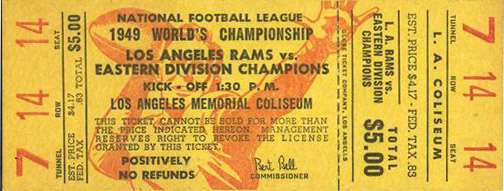
Headlines the morning of the game proclaimed "70,000 Will See Pro Title Battle."
- After pioneering college post-season games with the Rose Bowl, California would host its first pro title game although the Rams franchise had won the 1945 NFL crown in Cleveland before moving west for the '46 campaign.
- Seats beween the goal lines in the Los Angeles Coliseum went for $5 with $3.60 elsewhere. Presale tickets numbered 24,980. But a strong walkup business was anticipated because the forecast for Sunday called for a typical Los Angeles day – good weather and a fast field.
- Unfortunately, the weather forecast couldn't have been more wrong. Sunday, December 18, 1949, was a gloomy day in LA. All-night rain continued through the third period of the game – 1.05" by 4 pm. The Coliseum turf turned into a quagmire. Let's just say that it was not a Chamber of Commerce day.
- Early Sunday morning, owners Dan Reeves of the Rams and Jim Clark of the Eagles, with the support of their coaches, called Commissioner Bert Bell in Philadelphia. With the rain discouraging the public from attending, the owners wanted to postpone the game a week to Sunday, December 25. But for the second year in a row, Bell ordered the game played, citing the $30,000 contract the NFL had signed with the Dupont Network to televise the game as well as the coast-to-coast radio broadcast of the game. "This is a chance to show pro football's championship coast to coast, and we're not going to give it up," insisted Bell.
- A half hour before the 1:30 kickoff, a cluster of Eagles gathered in the stadium tunnel to scan the conditions. Hardly anyone was in the stands. Their dream of a big payday had turned into a nightmare. Now they probably wouldn't earn enough to cover the beer and steaks in the club car on the train ride home.
Dick Cresap of the Philadelphia Bulletin did a head count 30 minutes before kickoff and reported 176 people in the stands. Undoubtedly, many huddled under the stands out of the rain until the game started.
- 22,245 fans braved the pelting rain to watch a game that scarcely reflected the state of the pro football art in 1949. The conditions favored the stronger running team, the Eagles. The fans huddled under blankets, canvas, umbrellas, oilcloth, or anything they could find in their closets.
Ferrante: "We were ready to play the game. We weren't ready for the weather, though. In 1948 we played in Philly's worst snowstorm. In 1949, it looked like L.A.'s answer to the Johnstown Flood. With the field in the condition it was, we knew we couldn't pass that much."
Maronic: "At least we could still play for pride. Once we got our minds on the game, it was a pretty easy time for us. Our defense – guys like Vic Sears, Piggy Barnes, and Mike Jarmoluk – was outstanding. It was really fun to sit on the bench and watch them when the offense was out. ... The field conditions really were horrible, though. What I remember is covering punts. In '48, the ball would disappear in the snow. In this game, it would actually sink out of sight in the goo."
|
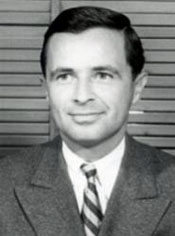
Dan Reeves
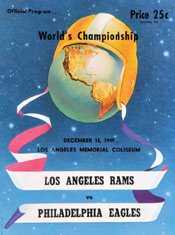
|
- Quarter 1
The two captains stood between the puddles at midfield as referee Ron Gibbs indicated the Eagles would kickoff.
Sporting a fitting last name for the day's conditions, Bob Waterfield had a towel hanging from the back of his belt to keep his hands dry as the Rams started from their 21. A run and a short pass to Vitamin Smith produced a first down at the 31. But two rushes that netted just 1y and an incompletion brought on the punt team.
The Eagles went nowhere, and Smith gingerly returned the ensuing kick through the puddles to the Philly 44. Shaughnessy, like Neale, always had a trick up his sleeve for big games. Today he
used T Dick Huffman as an eligible receiver. Waterfield flipped a quick pass as he backpedaled with the snap to the 255 lb bowling ball who rumbled 18y. However, an illegal motion penalty negated the play. The Rams couldn't overcome 1st-and-15 and punted, but a roughing the kicker penalty gave them new life. Again using the short toss to Smith to gain six, Waterfield misfired on a long pass on 3rd down. With nothing to lose since a missed field goal gave the opponent the ball on the 20, Shaughnessy called for the attempt, but Waterfield's boot sailed wide right.
The period wasn't half over, and it had become nearly impossible to read the numerals on the mud-caked warriors on both sides.
The Eagles moved 42y entirely on the ground to the Ram 38. Van Buren skirted both right end and left end while Smackover Scott took quick handoffs up the middle before making a shifty run around the left side on the slippery turf to the Ram 39. But LA finally stopped the rushing onslaught and when Thompson's 3rd down pass whizzed over the sideline, Joe Muha boomed a punt into the end zone.
Van Buren: "Early in the game, I got knocked out of bounds near their bench. One of their guys said, 'We're gonna kill you, Steve.' It made me mad. I told Thompson, 'Give me the ball.' So he did. He just kept giving it to me."
The Rams tried to run up the middle and around the flank but could gain only 3y. On the final play of the period, Waterfield punted to the Eagle 37.
End Quarter 1: Rams 0 Eagles 0
|
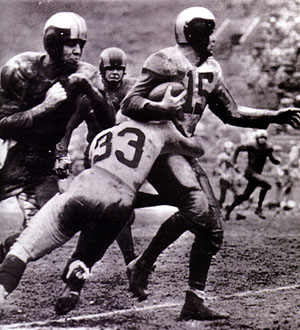
Jerry Williams tackles Steve Van Buren.
- Quarter 2
With the Rams playing their safeties up close to stop Van Buren, Thompson suddenly abandoned the ground game and went to the air. Before the Rams could put out the fire, Philadelphia had swept 63y for the first score. After an incomplete pass, Tommy hit E Jack Ferrante for 11. Pritchard picked up two around end before retiring for the afternoon with an injury. After that bad break, the visitors got a good one. Thompson whipped another pass that went off Pete Pihos's outstretched hands forward to Ferrante, who made a diving catch on the 34. Van Buren followed the blocking of RT Al Wistert around right end for three. Despite the slippery ball, Thompson faked a handoff to Van Buren and rifled a pass down the middle to Pihos, who made a leaping catch on the 14 between two converging defenders and dashed over the goal with nary a hand laid on him. Reliable Cliff Patton booted the PAT. Eagles 7 Rams 0
Neale said of Jack Ferrante: "Not one out of five million boys could play in this league without college or high school experience. Jack is the exception. He can catch the football as well as any receiver in the league, and he knows what to do with the ball once he has it."
Ferrante began playing football at age 14 on the sandlots of South Philly. The Eagles signed him after a tip from a delivery boy bringing groceries to owner-coach Bert Bell in 1939.
Jack had no trouble being accepted by the college grads on the team. "No one on the team said anything about my background. We had guys from big schools like Michigan, Indiana, Stanford, places like that, but they didn't look down on me. I was accepted the same as everyone else. I was just another guy on the team doing my best to help them win. That's all anyone cared about. At the home games, though, they would introduce the starters and give their position and college. For me, the announcer would say, 'And from the sandlots of South Philadelphia, Jack Ferrante.' The crowd would give me a big cheer. I loved it. What Philly kid wouldn't?
The Rams couldn't get past their 25 and punted. Van Buren, an excellent mudder, shed tacklers around right end for 5y to the 40. After sneaking for two, Thompson threw a pass to the right sideline that was intercepted by a diving Don Currivan at the Ram 36.
Waterfield called the tackle eligible play again. He hit Huffman running straight down the field to the Eagle 45. The identical call gained another eight. But that was as far as the Cali Boys could get, and Philly took over on downs.
Running the right end sweep that had repeatedly produced good yardage, Van Buren gained seven to the 43. Two plays later, Steve started left, then took the ball on a double reverse around right end. He roared into the open and, using a nifty change of pace move, chugged 49y down the sideline before being hauled down from behind on the Ram 14. Another touchdown would practically lock up the game for the Eagles because of the weather conditions and the way the defense was controlling Waterfield & Company. But it was not to be. Sturdy Steve and Jimmy Parmer advanced the ball to the eight in two cracks at the line, but Parmer fumbled on the next plunge, and Huffman recovered on the seven.
Waterfield tried to surprise the defense with a pass from his goal line but didn't connect. After a short gain, Bob punted on 3rd down across midfield to the 41.
Big Van promptly rocketed around right end for 23 to the 36. On 3rd down, Thompson threw a jump ball down the middle that Scott leaped and snagged on the 15, and once again the Eagles were knocking on the door. But the Ram line stiffened and dropped Scott and Frank Ziegler for three and 5y
losses on the next two plays. Faced with a third down and 18 on the 23, Tommy unleashed another aerial but threw it short into the hands of Currivan on the two.
Waterfield ran two sneaks
to eat up the remaining seconds of the half.
End Quarter 2: Eagles 7 Rams 0
|
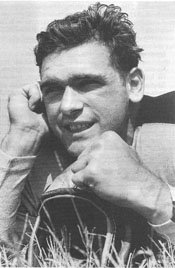 Jack Ferrante
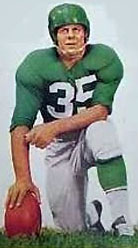
Pete Pihos
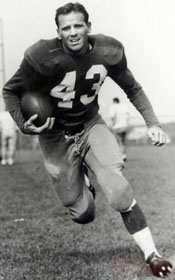
Jimmy Parmer
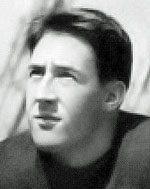
Don Currivan
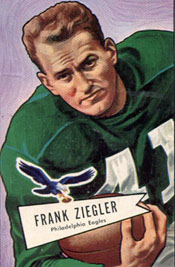
|
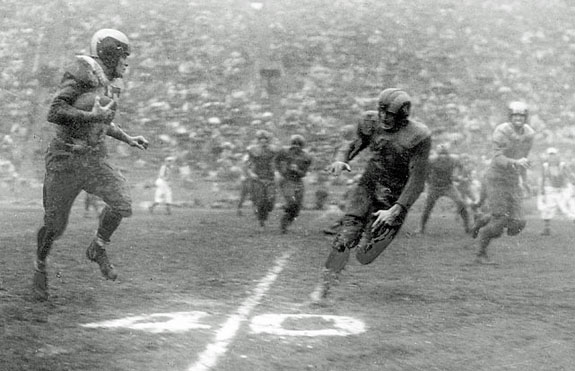
Van Buren in the open field on one of his record 31 carries.
- Quarter 3
The Eagles came out in clean white jerseys, although they wouldn't stay that way long.
Showing amazing nimbleness on the sloppy field, Scott sprinted to the 37 with the kickoff. Then he took two straight crossbucks up the middle into Philly territory at the 43. After Clyde toted the pigskin through the center twice to the 35, Thompson called for a sweep around the Rams' vulnerable right end. But this time the defense was ready and threw Smackover back to the 43. The punt went into the end zone.
After a penalty moved them back to the 10, LA managed to push the ball out to the 15. But that's when disaster struck. Waterfield dropped back to punt from the four. But the pass from C Don Paul's wet hands was high, and Bob had to leap off balance to field it. By the time, he righted himself to punt, LE Leo Skladany was on top of him and blocked the punt. Leo gathered in the loose ball on the LA two and careened over the goal. Patton added the point. Eagles 14 Rams 0 with 5:13 gone in the period.
Skladany was a rookie who started the season playing for a semipro team in Patterson NJ. He signed with the Eagles in December when veteran E Johnny Green was injured. "You don't expect a rookie to make that kind of play in a championship game," Sears said. "Waterfield was a great punter, one of the best in the league, and Leo almost took the ball off his foot. It gave us a tremendous lift. We knew there was no way the Rams were going to come back from 14 points down."
Down two touchdowns in the second half means the underdog must pass, pass, pass. That was LA's strong suit but not in these conditions against a defense that had thoroughly bottled them up. Most of the game, the Eagles employed a 7-2-2 or a unique 7-4 defense whenever the Rams spread their ends and backs.
Nevertheless, Waterfield came out firing and connected on three in a row – slant-ins to his right end and left end, then a delay over the middle to FB Dick Hoerner – to move into Philly territory at the 43. But a heavy rush forced two incompletions, and Waterfield punted to the 10.
If the Eagle offense earlier was mostly Van Buren left, Van Buren right, and Scott up the middle, it was more so now protecting a lead. Steve would set championship game records with 31 carries for 196y. Altogether, Philly ran the ball 61 times and controlled the clock with 70 snaps to just 51 for the Rams.
When two Scott runs gained seven, Neale, no doubt recalling his team's second touchdown of the afternoon, ordered a 3rd down punt that traveled to the LA 43.
Shaughnessy's offense went backwards from there on a 3rd down sack back to the 33. So Waterfield punted to the 15.
The Eagles ran three times for a net of 2y. The third down play showed Van Buren's greatness. Taking a pitch going to his right, the former LSU star shrugged aside a blitzing defender at the 10, reversed field, and weaved his way to the 17.
With the rain coming down in sheets and puddles on the field turning into small lakes, the Coliseum lights were turned on.
Pihos: "Steve was hell on a leash that day. His stamina was unbelievable. How he kept going in those conditions, I'll never know. It was like running in glue."
The home team got their best starting position of the day when the punt reached only the Eagle 39. The Rams promptly moved to a first down on the 25, their deepest penetration of the afternoon, as the quarter ended.
End Quarter 3: Eagles 14 Rams 0
- Quarter 4
On the first play, Waterfield's pass slipped out of his hand and landed in the hands of DB Frank Reagan in the muck under the goal post at the two.
The "Belligerent Bull of the Bayous," feeling like he was back home in the swamps of South Louisiana, showed that he still had plenty in his tank after light use in the third quarter. With the home crowd roaring to inspire their defense, Steve ran for six at right tackle, then 14 for a first down, again for four, then a 25y jaunt to the 48. After an offside on a punt extended the next series, he kept plowing behind great blocking to the 31. Finally, with nine men in the box on a 4th and short, the Rams held and took over on downs. Still, the Eagles had not only shifted field position but had also run precious minutes off the clock.
Shaughnessy passed the towel to Norm Van Brocklin to see if he could move the club. But three straight incompletions led to a short punt to the Philly 45.
Three Van Buren runs gained 13 and a first down. A few snaps later, the crossbuck handoff to Scott up the middle worked again for 8y to move the chains to the 33. Aided by two penaltes, the Rams blunted the thrust. So Muha punted to the seven.
Just as the Rams knew the Eagles would run every down, the Eagles expected Van Brocklin to pass on every snap. And that's what he did. He completed a nice one to the 18. But after two errant throws, Norm lost the handle on the ball as he rared back to pass and was fortunate to recover on the four. All the desperate Rams could do was punt out to the 48 and hope for a miracle.
The Eagles gouged the massed defense for their 17th first down on three runs to squeeze the last seconds off the clock.
Philadelphia finished the second half without throwing a single pass.
LA managed to gain only 21y rushing, one less than the previous low of 22 registered by the Redskins the year the Bears walloped them 73-0 in 1940.
FINAL SCORE:
EAGLES 14 Rams 0
|
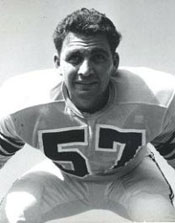
Don Paul
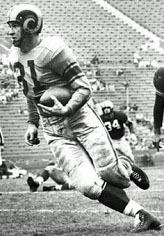
Dick Hoerner
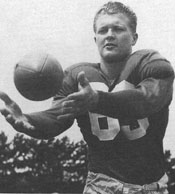
Leo Skladany
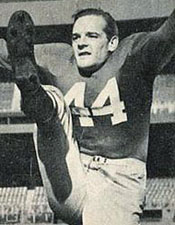
Frank Reagan
|
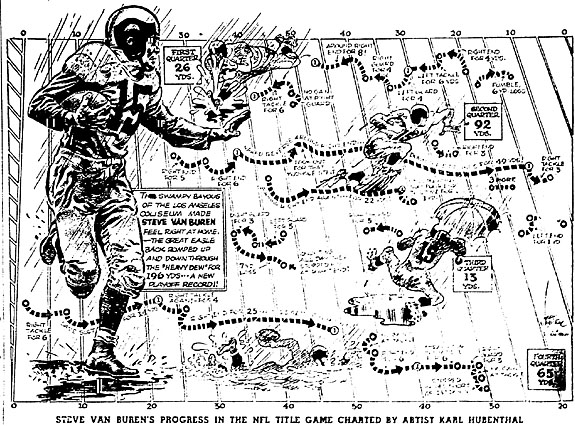 Sporting News
Sporting News cartoon
Final statistics:
- First downs: Eagles 17 Rams 7
- Yards rushing: Eagles 61-274 Rams 24-21
- Passing: Eagles 9-5-2/68 Rams 27-10-1/98
- Return yardage: Eagles 5-47 Rams 3-37
- Fumbles-Lost: Eagles 4-1 Rams 1-0
- Penalties: Eagles 6-40 Rams 4-25
- Punting average: Eagles 6-36.3 Rams 9-38.1
Postgame
- Neale praised his entire team but especially his defense, which held the Rams to a meager 119y total and just 21y on 24 rushing attempts.
Naturally, Greasy singled out his star running back. "Steve Van Buren ran the best I ever saw a man run. Maybe Red Grange was better than Van Buren today. Maybe Bronco Nagurski was better. But I'll bet nobody ever ran like Van Buren did in this mud." He added: "The Rams played a fine game, but we're just lucky enough to have their number. They couldn't handle our line and Van Buren ... and that was the difference."
Neale's mind went back to the team meeting Saturday night. "We won the world championship right there in the Bel Air Hotel, and Al Wistert is the guy who did it. The boys were not up. Something was missing. So he just plain fired them up with the best pep talk I ever heard."
Asked about the upcoming season with the inclusion of three teams from the AAFC, the Eagle coach replied, "I don't see why our boys can't do it again. Who is there to beat us?" When someone called out, "What about Cleveland?" Greasy gave a dismissive answer that would come back to haunt him. "Why, all they do is throw the ball."
- Van Buren had no idea he set a postseason rushing record until Cresap informed him in the locker room. "I got 196 yards?" he said. "I thought I was doing pretty good but figured it was only a little over 100. Boy, that's what you can do with blocking."
- Thompson: "We were in control all the way. There was never any doubt in my mind. Of course, we're used to this kind of slop. But I figured our running attack was too much for 'em. We just hammered right at the guards and center."
- Shaughnessy praised his opponent but also credited the conditions with playing a big role in the outcome. "The Eagles were a great team today! We didn't have a fair chance though. This was their kind of a day. That type of weather is suicide for us. We just don't have the kind of a team that can operate effectively in the mud. We had to play both the Eagles and the weather. However, don't take anything away from the Eagles. They were magnificant. They had speed, power, kicking, passing, ... and an awful lot of experience. Add the weather to that, and you've got the answer to why the Eagles beat us."
- Waterfield: "Those Philadelphia linemen are the smartest I've ever faced."
The players split 70% of the net receipts of $107,978.94.
- The Eagles earned $1,090 per man, far less than they imagined before leaving for the West Coast.
Pritchard: "If you think we were mad, you should've seen our wives. They had their fur coats on order. They had that money spent already."
Before leaving for home, the Eagles' new owners threw a victory party at the Bel Air Hotel. Each player was given a cigarette lighter as a memento of the second consecutive championship. "It wasn't even engraved," said Wistert. "It was a plain Zippo lighter. I thought, 'Isn't that wonderful? A cigarette lighter, for two world championships.' I didn't even take mine."
Van Buren had a more positive memory of the party because Johnny Weissmuller, who starred as Tarzan in the movies, attended along with other Hollywood stars, including Bob Hope and Clark Gable. "When I met Weismuller," recalled Steve, "he had a drink in each hand. I couldn't get over it. I never pictured Tarzan drinking."
- Each Ram's cut was $789.
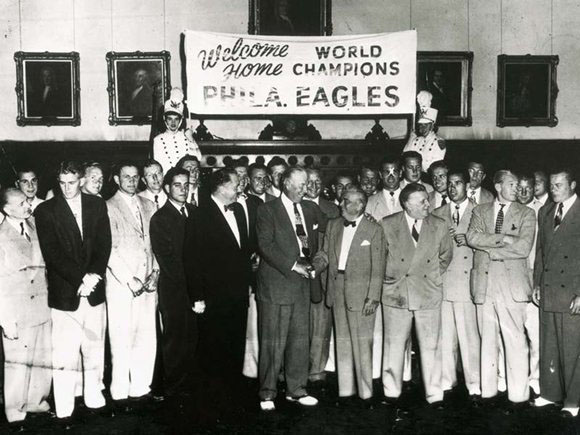 References: Championship: The NFL Title Games plus Super Bowl, Jerry Izenberg (1970)
Pro Football’s Greatest Moments, Jack Clary (1989)
The Eagles Encyclopedia, Ray Didinger and Robert S. Lyons (2005)
"Philadelphia Memories," Jim Campbell (1979 NFC & AFC Championship Game Programs)
Top of Page
|
|

























